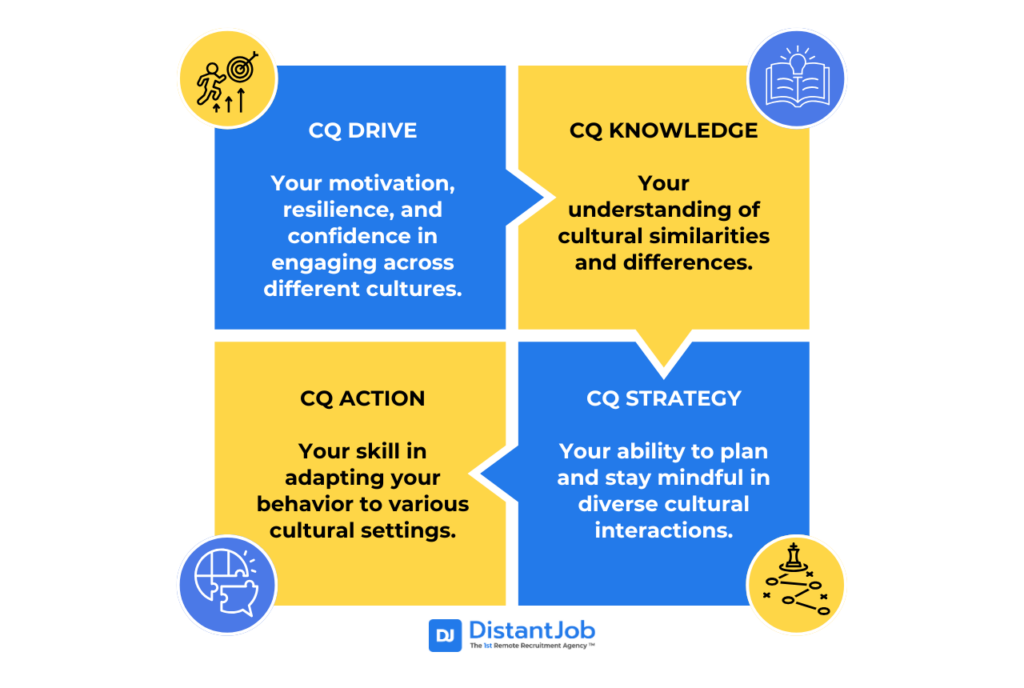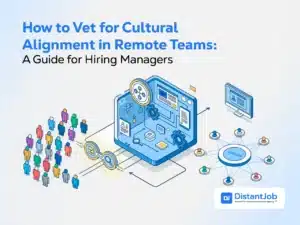Is your remote team having trouble staying in sync? Time zones aren’t the only issue—cultural gaps also need bridging. And that’s where Cultural intelligence (CQ) comes in, as it serves as a key tool to establish trust, sidestep communication issues, and maintain high output across teams spread around the globe.
In a virtual setup, cultural mix-ups can throw projects off track and damage team relationships. Cultural intelligence helps you avoid these problems paving the way for smooth teamwork and stronger links across countries. This skill isn’t just for team members—bosses with strong cultural smarts set an example making sure every chat builds respect and includes everyone.
So how do you get there? This guide explains what cultural intelligence means for remote teams and gives you practical steps to boost it, turning cultural smarts into your team’s secret weapon.
What is Cultural Intelligence?
Cultural Intelligence (CQ) is the capability to adjust well to new cultural environments and work with people from different cultural backgrounds. Rather than focusing on specific cultural nuances, CQ is about building a set of wide-ranging adaptable skills that apply across various cultures. Originally defined by Christopher Earley and Soon Ang, it combines empathy, awareness, and adaptability, bridging differences in race, ethnicity, and nationality. This skill is particularly crucial in professional settings where collaboration across cultures is essential for success.
Cultural Intelligence has four main skills that help teams work better together: CQ Drive (wanting to learn about other cultures), CQ Knowledge (understanding cultural similarities and differences), CQ Strategy (planning for cultural interactions), and CQ Action (changing behavior to fit different cultural settings). These skills work together to help teams overcome cultural barriers creating a welcoming and effective remote work environment.

Why Does Cultural Intelligence Matter for Remote Teams?
When it comes to remote teams, cultural intelligence (CQ) is more than just about getting along—it’s a key asset that has an influence on trust, productivity, and smooth teamwork across different countries. When working online, team members miss out on the small face-to-face signals that help create understanding. So, CQ becomes the link that keeps your team in sync and involved, no matter where they are.
Let’s look at feedback and time management as examples: in one culture, giving direct feedback is normal and shows respect, while in another, people might see it as too blunt or even confrontational. In the same way, some team members expect deadlines to be flexible, while others stick to timelines. Without CQ, these differences can create frustration and misunderstandings that have an impact on how well the team works together. But with it, your team learns to notice these small differences, adjust their expectations, and turn cultural diversity into a strength, making teamwork and productivity better.
And here’s why it matters for business: firms with lots of diversity are 40% more likely to make more money. CQ isn’t just a nice-to-have skill—it gives companies an edge that boosts new ideas, keeps people around, and helps grow in a world where work happens all over the globe. When you use CQ, you’ll see your team change from just working side by side to succeeding together.
How to Apply the Four Cultural Quotient (CQ) Capabilities in Distributed Teams
To create a top-notch remote team using Cultural Intelligence (CQ) means more than just knowing cultural differences—it’s about weaving CQ into everyday talks and team tasks. This guide shows you practical ways to use each CQ skill in your team, from boosting motivation to adjusting how you talk in real-time making sure your team isn’t just mixed but works together and feels connected.
1. CQ Drive: Cultivate Motivation and Curiosity
CQ Drive is about having the energy and real interest in mixing with different cultures. For remote teams, this curiosity keeps things exciting and open-minded.
Here’s how to make it happen:
Hold Monthly Culture Exchange Hours where team members can talk about workplace customs from their cultural backgrounds. This gives people a chance to discuss different ways of handling feedback and managing time, which sparks interest and leads to useful cultural insights.
Start Cultural Curiosity Challenges by asking team members to take small steps, like learning a simple phrase in a coworker’s language. Recognize these efforts in meetings or chats to show that curiosity is a key team value.
2. CQ Knowledge: Apply Cultural Awareness to Real Situations
CQ Knowledge involves understanding the details of cultural differences—in communication, work methods, and expectations. This knowledge helps everyone steer clear of unintended mix-ups and show respect for each other’s unique work styles.
To make cultural knowledge useful, try these methods:
Create a Team Culture Guide showing how each person likes to communicate, work, and what holidays matter to them. Keep this guide up-to-date to help teammates stay aware of the real preferences and norms that affect how they work together.
Include a “Culture Crash Course” When Onboarding new hires covering the main cultural aspects of the team and practical tips, like how people prefer to receive feedback or what a typical workday looks like. This helps new members navigate the team’s unique way of doing things from the start.
3. CQ Strategy: Think Ahead and Look Back for Smooth Teamwork
CQ Strategy involves pausing to think before acting in cross-cultural situations. It aims to predict potential differences and plan for smooth interactions, which matters for remote teams.
Here are ways to help your team plan adapt, and learn from each encounter:
Use Pre-Meeting Culture Briefs before important talks outlining how different attendees might approach certain subjects. This helps team members expect communication styles and handle expectations well.
Add a “Debrief and Reflect” Routine after each big project. Team members can share observed cultural patterns and what they changed based on them building a shared knowledge base that enhances future interactions.
4. CQ Action: Adapt Behaviors in Real-Time
CQ Action brings together all that knowledge and planning. It’s the ability to adjust behavior to ensure smooth communication regardless of cultural background.
To promote effortless adaptation:
Start a Check-In Practice During Meetings where team members ask, “Does everything make sense?” or “Does anyone want to share a different view?” every 15 minutes. This keeps everyone in sync allowing cultural alignment as it happens.
Make a CQ Signal, such as a special emoji or saying, to show when communication needs to change. Teams can use this in online chats to help members adjust their responses for better understanding and respect.
Using these CQ skills turns a diverse team into a unified cooperative powerhouse. By working these methods into daily routines, you’re building a team culture that sees diversity as an asset changing differences into chances for stronger connections and better results.
Common Challenges in Developing Cultural Intelligence for Remote Teams and How to Overcome Them
Building up cultural intelligence in remote teams comes with its own set of obstacles. Issues like communication styles, language skills, and even time zone coordination have an impact on everyday teamwork. If teams don’t use CQ as a guide little mix-ups can grow into bigger problems. This can break down trust, slow down work, and even make people feel disconnected from their jobs.
A common problem stems from different communication styles. Take, for example, how some cultures value direct talk as efficient and clear, while others see it as too blunt. Also, language skills add more difficulty, as people who aren’t native speakers might struggle to get subtle sayings or work lingo, which can make them feel left out or upset.
Time zones also have a big impact on how remote teams work. When one team member’s best work hours overlap with another’s off time, lining up schedules and setting response times can be tough, often causing delays and missed deadlines.
But we can overcome these challenges with the right approach. Regular team workshops that aim to boost cross-cultural awareness can promote understanding and build a strong base for cultural intelligence. Cross-cultural communication training can give team members the tools to spot and adjust to different styles. Also, setting clear rules for virtual meetings—like agreeing on response times and setting up norms for feedback—ensures smoother more respectful talks across cultures.
These steps allow remote teams to handle the subtle differences in diverse communication styles and cultural views leading to a more unified, effective, and involved workforce.
Cultural Intelligence for Leaders: Building CQ in a Remote Workforce
For leaders, cultural intelligence has an impact on more than just understanding differences—it’s a practical skill set that changes how you guide, support, and inspire a remote team. To develop CQ as a leader means to know how to adapt your style to build real trust and connection, no matter where team members work.
Tailor Your Communication
Start by learning how your team members prefer to communicate. Some might like direct straightforward feedback, while others might respond better to a more nuanced, context-driven approach. Adapt your communication to respect these differences; this approach shows respect and cuts down on possible misunderstandings.
Model Openness and Curiosity
Lead by showing interest in each team member’s cultural roots. Small actions, like asking about local customs, help build connections and encourage team members to open up to one another creating an environment where people learn from each other and feel included.
Adapt Meetings and Project Due Dates
Different cultures view time management differently, which can affect how teams work together. Some team members might stick to deadlines, while others see them as more flexible. To handle both approaches, make project timelines clear and think about adding extra time. This keeps schedules realistic and cuts down on team conflicts.
Give Teams Control
Acknowledge and appreciate different ways of tackling problems by allowing team members to handle tasks in a manner that matches their cultural strengths. This fosters a feeling of responsibility and enables the team to come up with new ideas by tapping into various viewpoints.
When you lead with CQ, you create the groundwork for a team environment where everyone feels respected and appreciated. As remote teams watch their leader show these traits, they’re more likely to do the same creating a chain reaction that lifts team spirit and unity.
How to Measure and Increase the Cultural Intelligence of Your Remote Team
Measuring and boosting cultural intelligence (CQ) in your remote team can have a big impact on trust, communication, and flexibility across different backgrounds. Here’s a breakdown of ways to check CQ levels and practical tips to boost them—making sure your team doesn’t just work together, but gets and respects each other.
Measuring CQ
Before you can boost CQ, you need to know your team’s current skills. Picking the right test helps you spot areas to grow, from motivation to how people act in different settings.
Picking the Right CQ Test: Choose a test based on what your team needs, like being flexible, open-minded, or having specific communication skills. Here are some tests to think about:
- Cultural Intelligence Scale (CQS): Measures four CQ parts (Drive, Knowledge, Strategy, and Action) giving a full picture of each team member’s abilities.
- Intercultural Development Inventory (IDI): Checks how sensitive people are to different cultures, which helps to see how open and flexible they are in diverse teams.
- Implicit Association Tests (IAT): Looks at hidden biases and can show surprising unseen attitudes that might change how teams work together.
- Multicultural Personality Questionnaire (MPQ): Checks personality traits that help people work well across cultures, perfect to understand how well people will get along over time.
Understanding CQ Results: After you finish the assessments, connect CQ scores with team-building objectives. Let’s say CQ Drive (desire to interact with different cultures) scores are low. In this case, think about starting cross-cultural exchanges or mentoring programs to increase engagement and interest.
Developing CQ in Remote Teams
To improve CQ, you need a well-rounded approach. This includes ongoing training, mentoring, and real-world exposure to different viewpoints.
Training Sessions and Workshops: Start CQ workshops that focus on building flexibility and open-mindedness. Pick programs that match the specific CQ skills your team needs to work on, like good communication or building empathy.
Setting up Cross-Cultural Mentorship: Create mentorship pairs between team members who come from different cultures. This one-on-one exchange helps mutual understanding and adaptability allowing team members to learn and grow together.
Regular Cross-Cultural Team-Building Activities: Hold casual events like cultural sharing sessions where team members talk about their backgrounds, work methods, and traditions. This encourages ongoing learning in a relaxed environment and builds stronger team bonds.
Using Technology to Improve CQ Continuously: Use digital tools such as language translation apps and cross-cultural learning platforms to make CQ development easy to access and relevant. Examples include Duolingo for learning languages and platforms like Global Dexterity to train in cultural adaptability.
Tracking Progress in CQ Improvement
Tracking CQ initiatives consistently plays a crucial role in making sure they work well and line up with your team’s goals for growth.
Assess CQ Again and Again: Plan to check CQ levels often to see how much you’ve improved and change your plans based on how your team works together now. This helps make CQ growth a lasting team focus.
Team Talks About Their Experiences: Set up a way for team members to share what they’ve learned from working with different cultures. This ongoing process helps everyone keep getting better and lets you tackle any new problems that come up.
Use Numbers to Track CQ Growth: Start using numbers like how well the team works together, how good the communication is, and how involved everyone is. These numbers help you see the real effect of your CQ work and show you how cultural smarts are helping the team reach its goals.
Measuring and boosting CQ isn’t a one-off job; it’s an ongoing process that changes as your team expands. By weaving these approaches into your remote team’s daily routine, you’ll build a culture of respect, flexibility, and shared understanding that goes deeper than surface-level talks sparking real teamwork and output.
How Cultural Intelligence Helps Remote Teams Succeed
Cultural intelligence (CQ) plays a key role in successful, teamwork-oriented remote teams. It creates an atmosphere where people respect different viewpoints, break down communication obstacles, and build trust across countries. CQ helps people grasp and adjust to different cultural settings. This can boost team interactions leading to better output, more original ideas, and stronger teams in a worldwide workplace.
Putting money into developing CQ means investing in your team’s ability to handle complex situations and changes with self-assurance. You can do this through specific tests pairing people from different cultures as mentors, or regular CQ training sessions. These practices give your team the tools to use cultural diversity as a business strength.
Want to unlock your remote team’s full potential? Begin focusing on cultural intelligence now and see your team not just collaborate but thrive together. Get in touch with us at DistantJob to discover remote talent who share these values and bring CQ to your company.





